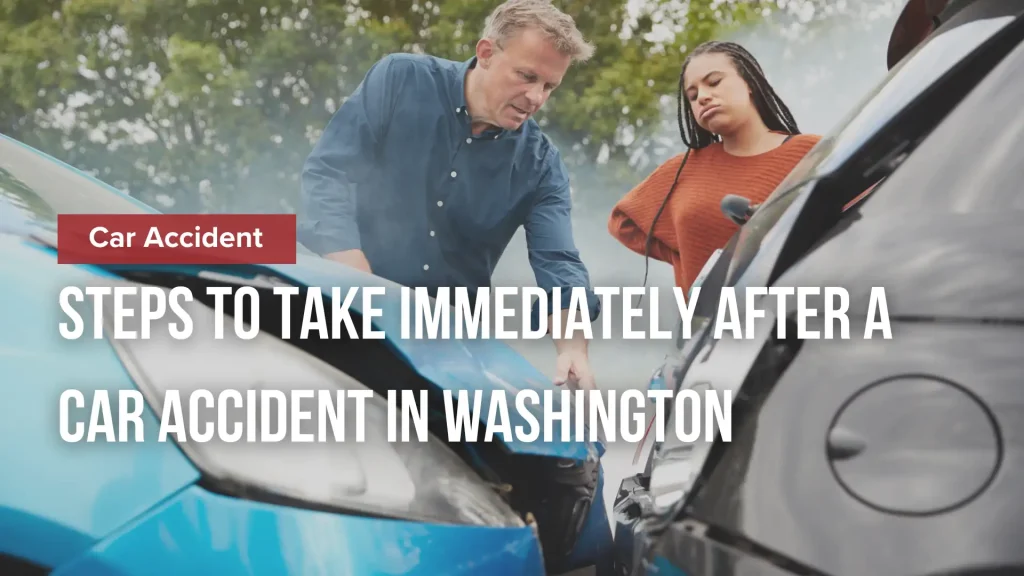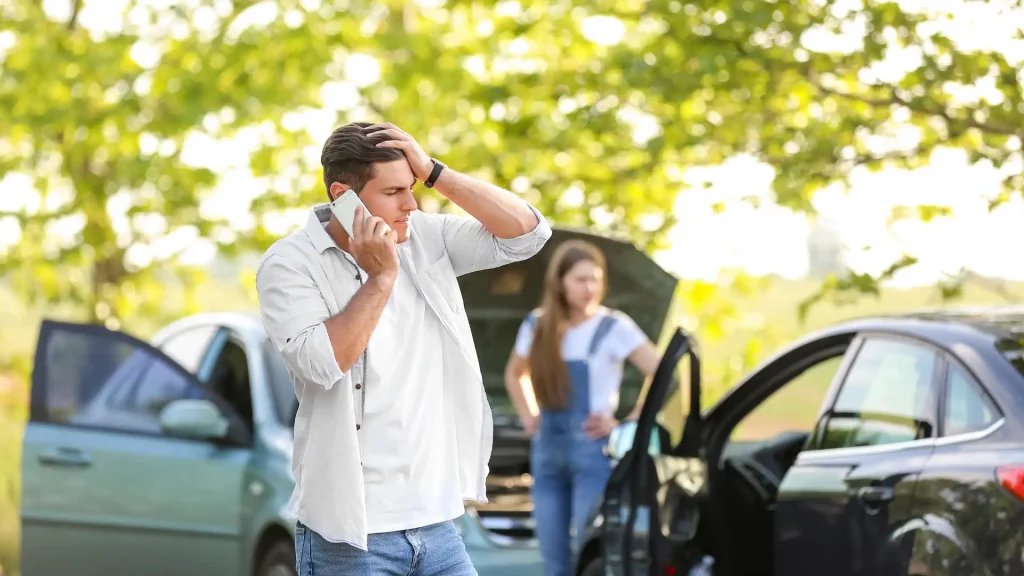
Car accidents are sudden, stressful events to experience. Even if you have a few seconds to anticipate a crash, the collision can be so jarring and upsetting that it’s hard to think clearly in the following minutes. Can we sue someone regarding the crash information?
Unfortunately, those minutes are also significant. What you say and your actions have substantial implications for what comes next. Here’s what to do after a car accident in Washington to protect your safety, health, and legal rights.
Step-by-Step Guide to Follow After a Crash
Washington’s fault-based insurance rules and mandatory reporting requirements can affect financial recovery after an accident. With this in mind, knowing what to do in the minutes and hours following a crash is essential. Take the following steps to protect yourself and preserve your right to seek compensation.
1. Check for Injuries and Call 911
Your safety – and the safety of others – comes first. Check yourself and your passengers for injuries. Then check on the occupants of other vehicles if you can do so safely. Call 911 right away. Even if the crash seems minor, Washington law requires drivers to report any accident involving injury, wrongful death, or property damage likely to exceed $1,000.
2. Move to a Safe Location (If Possible)
If your vehicle is drivable and you’re not seriously injured, move to the shoulder or a nearby parking lot to avoid blocking traffic. This can help prevent another collision. Turn on your hazard lights to alert other drivers. If your car is too damaged to move, stay inside with your seatbelt fastened until help arrives.
3. Remain at the Scene and Stay Calm
Never leave the scene of an accident without stopping. Washington law imposes severe penalties – including criminal charges – for hit-and-run drivers. Stay calm and be mindful of what you say. Avoid blaming others or admitting fault; even a casual apology could be used against you later.
4. Exchange Information with the Other Driver
You are legally required to provide your name, address, driver’s license number, vehicle registration, and insurance information. Ask for the exact details from the other driver. If the other driver is uncooperative or does not have insurance, let the responding officer handle the situation.
5. Document the Scene Thoroughly
Use your phone to take photos of all vehicles involved, visible damage, skid marks, traffic signs, weather conditions, and injuries. Take wide-angle shots and close-ups from different angles. Ask a passenger or witness to help if you cannot do this. Write down your recollection of what happened as soon as possible, while the details are fresh.
6. Speak to Witnesses (If Any)
If anyone nearby saw the crash, ask for their names and contact information. Neutral third-party witnesses can support your version of events, especially if the other driver disputes fault. Ask witnesses to stay and speak with the police if they are willing.
7. Cooperate with Law Enforcement
When the police arrive, stick to the facts. Tell them what happened without guessing or speculating. If you don’t know something, say so. The officer will likely create a report that could become essential evidence in your claim. Before you leave, ask how to obtain a copy of the report once it’s available.
8. Seek Medical Attention Promptly
Not all injuries show symptoms right away. You may not become aware of common issues like whiplash, concussions, or soft tissue injuries until hours or days after the crash. A prompt medical evaluation can uncover hidden problems and create a record that links your injuries to the accident. Follow your doctor’s recommendations closely.
9. Notify Your Insurance Company
Most insurance policies require prompt notice of a crash. Contact your insurer to start the claim process, but be careful not to admit fault or speculate about what happened. If the other driver’s insurer contacts you, it’s best to speak with a Washington car accident attorney before giving a recorded statement.
10. Avoid Social Media Posts About the Crash
Resist the urge to post photos, updates, or opinions about the crash on social media. Insurance adjusters and defense attorneys often look for online content that can undermine your claim. They may take even seemingly harmless posts out of context.
11. Consult a Washington Car Accident Attorney
If you suffered an injury, if the other driver is uninsured, or if there’s a dispute about what happened, a Washington car accident lawyer can help. They will explain your rights, guide you through the claims process, and deal with the insurance companies on your behalf while you focus on healing.
Additional Tips for Protecting Your Legal Rights

In addition to the immediate steps you take after a car accident or non-fault, taking certain precautions can strengthen your position if you pursue a claim. First, keep all records related to the crash. That includes medical bills, repair estimates, doctor notes, towing invoices, and correspondence with insurance adjusters. This documentation may be critical to proving the amount and extent of your expenses and losses.
Avoid speaking to the other driver’s insurance company without preparation and legal representation. Their goal is to minimize payouts, and they may try to get you to say something that hurts your claim. You are not required to give a recorded statement; you can refer them to your attorney if you have one.
Finally, be cautious about early settlement offers. Quick offers may seem helpful, especially if bills are piling up, but they rarely reflect the full value of your claim – especially if your medical treatment is ongoing. Your lawyer will help you pursue the maximum compensation you deserve.
Please read more about legally binding mediation here: Is Mediation Legally Binding?
Contact a Washington Car Accident Attorney Today
Knowing what to do after a car accident can help you stay calm and collected. But you’ll also need support, especially if you’re hurt and need to take action against the other driver. This is where Tamaki Law comes in. Our Washington car accident lawyers have served clients for over 30 years by providing highly skilled and personalized legal support. Our team is here to help you understand your rights and take the first step toward securing the necessary benefits. Contact us today at (800) 801-9564 to share your story and review your legal options in a free initial consultation.
Related Post
What to Do if You are Involved in a Car Collision
Rental Car Cost Coverage After An Accident In Washington Explained
